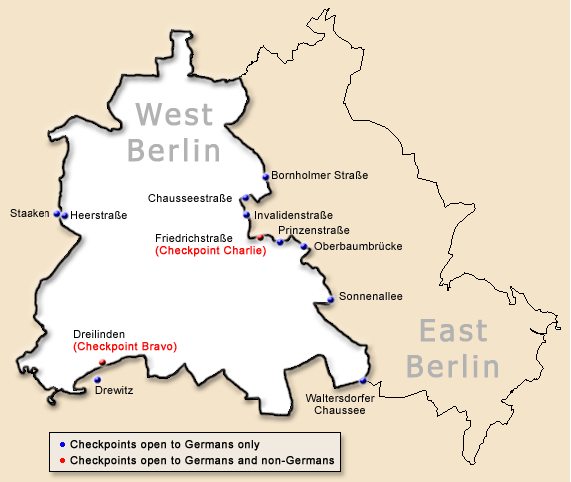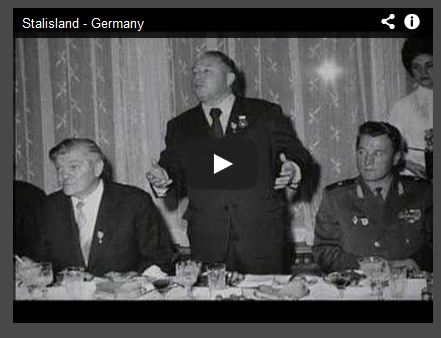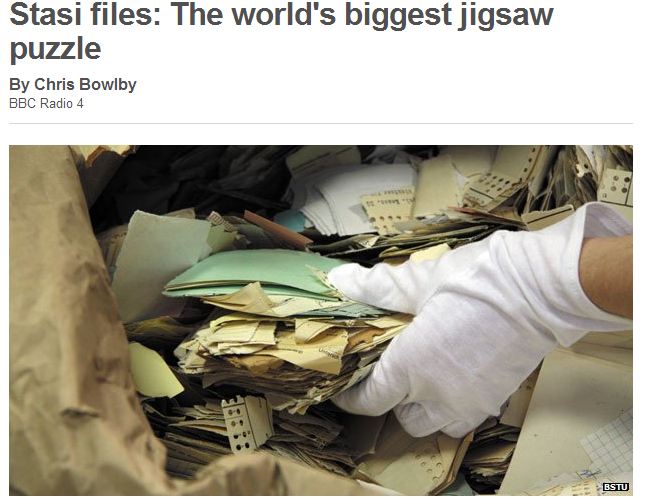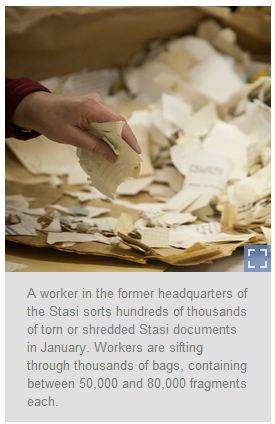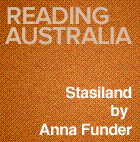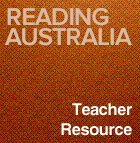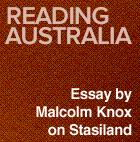AustLit
-
Stasiland tells the stories of people who lived in the German Democratic Republic (GDR, or East Germany) before the fall of the Berlin Wall in 1989. In the book, Australian writer Anna Funder talks to people about their experiences of life under the surveillance of the Ministry for State Security, also known as the Stasi. She also talks to some of the Stasi men.
This trail provides useful information and links to provide context and further reading. It is organised in four parts.
– Part One provides the historical context for Stasiland.
– Part Two looks at the efforts to reconstruct and reveal the the actions and impacts of the Stasi and the government's activities.
– Part Three gathers together film representations of the period.
– Part Four provides links to useful academic research and publications. Some of these critical works and other resources are available to read online.
Click the hyperlinks in the citations below to be taken to the full text.
-
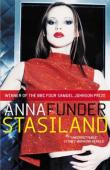 Courtesy the publisherSee full AustLit entry
Courtesy the publisherSee full AustLit entryTo write this non-fiction work about life in the former East Germany, Anna Funder interviewed former Stasi officers and the people they surveilled. Described in the National Library of Australia record as 'A book of travel, history and biography that reads like a documentary novel,' Stasiland takes 'a deliberately subjective and "literary" approach' to its material with an 'emphasis on a sympathetic authorial persona as the source of the reader's perspective' (Susan Lever 'The Crimes of the Past: Anna Funder's Stasiland and Helen Garner's Joe Cinque's Consolation'.
(...more)Explore the AustLit record for Stasiland to find references to many secondary and related works.
-
 See full AustLit entry
See full AustLit entryAnna Funder went to school in Melbourne and in Paris, and studied at the University of Melbourne and the Free University of Berlin. She holds a Doctor in Creative Arts (DCA) from University of Technology, Sydney (UTS).
Fluent in both German and French, Funder has written in her book Stasiland of her experiences in Berlin, both before and after the Wall came down.
She was Writer-in-Residence at the Australian Centre in the University of Potsdam in 1997 and has won the Felix Meyer Creative Writing award, the Australian German Association Fellowship, and an Arts Victoria literature grant.
Explore the AustLit author entry for Anna Funder to discover other works and details of her life and writing.
-
See full AustLit entry
Written for the Reading Australia project, this essay serves as an introduction to Anna Funder's Stasiland. Knox discusses the cultural setting in which the work was first published and examines the narrative techniques that Funder uses to depict her subjects. Knox also discusses how Funder's gender and her status as a foreigner affected her telling of the story.
(...more)Available online at Reading Australia.
-
Stasiland examines political and cultural events of great complexity. The background to some of those events is outlined below.
-
Construction of the Berlin Wall
In 1961, the Soviet-controlled East Germany began construction of the Berlin Wall to prevent further emigration of its residents to West Germany. As a result, East and West Germany would be separated until the fall of the Berlin Wall in 1989. This link below will show you a short excerpt from the BBC documentary The Secret Life of the Berlin Wall. It describes some of the events that led to the construction of the wall, illustrated with archival footage.
The Secret Life of the Berlin Wall. (Excerpt). BBC Two 7 Nov. 2009. Duration: 4:36. Online at http://www.bbc.co.uk/history/places/berlin_wall#p00jqq1j. Sighted 09/12/2013.
-
Behind the Wall
The Stasi monitored residents closely with surveillance devices and other mechanisms. With this YouTube video you can listen to acclaimed photographer Thomas Hoepker’s account of life in East Berlin, and then reunification, accompanied by his exceptional photographs.
'Life Behind the Berlin Wall.' The Economist 6 Nov. 2009. Duration: 9:28.
//www.youtube.com/embed/Z8BojR2BEt8 -
See full AustLit entry
Gert Reifarth grew up in East Germany. In this essay, first published in Meanjin, he reflects on life behind the Iron Curtain and the tactics he used to circumvent government control. At one point, he sends coded letters to friends in the west so that they will smuggle in a copy of Solzhenitsyn’s The Gulag Archipelago. As an adult now living in Melbourne, he discusses his feelings about the past and future of the former GDR.
(...more)Reifarth, Gert. 'Born in the GDR: An Inside Account.' Meanjin 66.2 (2007): 164-171.
-
Then and Now: A Stasiland Documentary
'Everyone knows about the Nazi's camps of Auschwitz and Dachau. But few are aware of the systemic oppression that went on under the Stasis.'—Journeyman Pictures
This documentary, from December 2006, shows Anna Funder as she travels to the former East Germany and shows present-day citizens discussing events of the past. It also shows archival footage of the Berlin Wall.
Germany - Stasiland. Journeyman Pictures. 11 Dec. 2006. Duration: 22:34. Online at http://www.journeyman.tv/?lid=57040. Sighted 09/12/2013.
-
See full AustLit entry
In this essay, Leslie Bodi writes about the 'role of intellectuals and writers in ensuring the reinstatement of civil society and democracy in East Germany after the opening up of German border in November 1989 [...] Their participation in struggles to allow GDR citizens to view the documents gathered by the GDR Ministry of State Security (Stasi) or the Stasi files is highlighted for their efforts to support the victims of government surveillance in GDR.' (Source: Author's abstract.)
(...more)Bodi, Leslie. 'Intellectuals, Writers and the Stasi Files.' Meanjin 52.1 (1993): 7-22.
-
The Stasi kept meticulous paper files and owned few shredders. When the Berlin Wall fell, Stasi staff tore documents by hand and stuffed them into sacks, planning to dispose of them later. They were never disposed of, however, and now a team at the Fraunhofer Institute in Berlin is using digital technology, in the form of an ‘e-Puzzler’ machine, to scan and piece together between four and six hundred million pieces of torn documents. Following are articles and audio recordings that discuss the reconstruction process.
-
'Stasi Files: The World’s Biggest Jigsaw Puzzle'
Chris Bowlby’s article discusses the reconstruction process. It also discusses the digitisation of thousands of Stasi sound recordings from surveillance operations. The recordings are usually unlabelled and require sophisticated detective work on the part of researchers to determine what they are listening to.
Bowlby, Chris. 'Stasi Files: The World's Biggest Jigsaw Puzzle.' BBC News Magazine, 14 Sep. 2012. Online at http://www.bbc.co.uk/news/magazine-19344978. Sighted 09/12/2013.
-
Phillip Reeves’s radio story also covers the e-Puzzler, and interviews some of the researchers who are piecing together the documents.
Reeves, Phillip. 'Piecing Together "The World's Largest Jigsaw Puzzle."' NPR Radio. 8 Oct. 2012. Duration: 7:40. Online here. Sighted 09/12/2013.
-
'Secret Files: How Shredded Stasi Files are Reconstructed'
This short Deutsche Welle story shows the e-Puzzler machine and the historians at work piecing together the ripped documents.
'Secret Files: How Shredded Stasi Files are Reconstructed.' Deutsche Welle. 6 Jan. 2012. Duration: 5:51.
//www.youtube.com/embed/GHDX0VJq37s -
Since the reunification of Germany a number of feature films have been made that explore life under the Stalinist regime. The IMDb (the Internet Movie Database) lists hundreds of films and documentaries in multiple languages.
The films listed below are recommended.
-
The Lives of Others
Perhaps the most acclaimed film to depict life in East Germany is The Lives of Others (2006), directed by Florian Henckel von Donnersmarck. It follows an agent of the secret police in his surveillance of a couple with whom he grows increasingly fascinated.
//www.youtube.com/embed/n3_iLOp6IhM -
Barbara
Christian Petzold’s Barbara (2012) is the story of a doctor who, in the 1980s, is sent to work in a remote area as punishment for applying for an exit visa.
//www.youtube.com/embed/-l3VRf3enx8 -
Good Bye Lenin!
Wolfgang Becker's Good Bye Lenin! (2003) is a comedy drama set in 1989 in which a young man attempts, for the sake of his ill mother, to maintain a façade that the Berlin Wall has not fallen.
//www.youtube.com/embed/mIjSaHUKD5I -
Stasiland is of interest to scholars of literary journalism, who in the following collections of articles examine Funder’s approach to her subject matter and how the work was received in different contexts. It is also of interest to translation scholars, because it was written in English, but drew on German interviews, and was subsequently translated into German.
-
See full AustLit entry
In this conference paper, available at the Academia.edu repository, Susan Lever compares Stasiland to Helen Garner’s Joe Cinque’s Consolation. The paper 'considers the similarities in approach to real events of Anna Funder's examination of the GDR and its system of surveillance, and Helen Garner's account of the trials of the killer of a young man in Canberra.
(...more)Lever, Susan. 'Against Forgetting: Anna Funder’s Stasiland and Helen Garner’s Joe Cinque’s Consolation.' Unpublished conference paper delivered at the ASAL conference, Perth, 2006. Published on Academia.edu.au. Online here. Accessed 09/12/2013.
-
See full AustLit entry
'This article contends that literary journalism, like its component parts of literature and journalism, is a construct based on different culturally and socially accepted conventions. German and Australian views of literary journalism are shaped by different histories and expectations, as the reaction to Anna Funder’s book Stasiland in Germany demonstrates. It examines the German cultural context at the time of Stasiland’s publication, and argues that the different approaches to privacy and to literary journalism in Australia and Germany resulted in vastly different receptions for the book.
(...more)Josephi, Beate and Christine Müller. 'Differently Drawn Boundaries of the Permissible in German and Australian Literary Journalism.' Literary Journalism Studies 1.1 (2009): 67-78. Online here. Sighted 09/12/2013.
-
See full AustLit entry
The 3rd Conference of the International Association for Translation & Intercultural Studies (IATIS) was held at Monash University, Melbourne, in July 2009. The theme of the conference was 'Mediation & Conflict: Translation and Culture in a Global Context' and embraced such topics as cultural translation, the translator/interpreter as cultural broker in a trans-national world, the role of literary translation in challenging or reinforcing cultural difference, new media in translation, and political and ideological dimensions of translation.
(...more)Gerber, Leah. 'Australian Voices in Germany : The Translation of Anna Funder's Stasiland into German.' Sydney PEN Magazine Nov. 2009: 20-26.
-
AustLit has indexed many works that deal with German politics and with over 320 authors born in Germany listed in AustLit it is possible to discover deep connections between the two countries across our history.
-
Anna Funder – Dymphna Clark Lecture – 17 October 2013
Reading My Mind - and Yours. A celebration of the act of the human imagination that is writing, and the act of the human imagination that is reading.
In Anna Funder’s novel All that I Am the character Ruth says ‘to imagine the life of another is an act of compassion as holy as any’. Anna Funder tells stories that show the power of the human imagination: the power to make the world make sense. And the power to travel not only in time and space, but into another person’s consciousness. From lauding authors as intelligent designers in an age of blithering factoids, to the dangers of real-life truth telling in an age of denial, to the mantra of all mothers: ‘I did my best. It wasn’t enough. But it could have been worse.’ Come and hear Anna tell stories to show why reading and writing are worth placing at the centre of a life.
Dymphna Clark, an extraordinary scholar and acclaimed writer, was married to Manning Clark and mother of Sebastian Clark (now President of Manning Clark House). It was she who bequeathed the family home to the intellectual and cultural community with the wish that it be used to support artists and public intellectuals and provide a safe haven for the entire community. The Dymphna Clark Lecture is delivered annually by a lecturer who exemplifies the deep commitment Dymphna Clark showed to Australia’s intellectual and cultural life.
The Dymphna Clark Lecture is presented by the University of Melbourne in partnership with Manning Clark House.
//www.youtube.com/embed/fr80CkCmZsU
You might be interested in...



